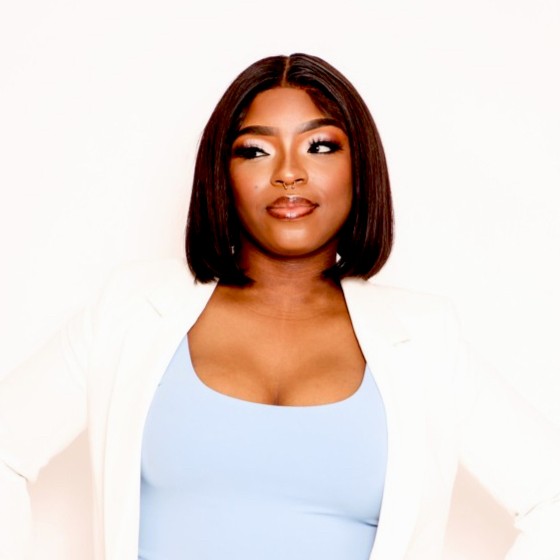Students
Class of 2026
Community
Featured News
Nylah DeCohen — Styling Revolution Through Fashion and Queer Liberation
 For Nylah DeCohen, C'2026, fashion is far more than aesthetics — it’s a form of protest, preservation and power. A third-year comparative women’s studies major and entrepreneurship minor from Virginia Beach, Virginia, DeCohen serves as the outreach chair of Afrekete, Spelman’s oldest and only LGBTQIA+ organization. This year, she also curated the Spring Fashion Show: "Codified Couture: Past, Present and Power | Exploring the Intersection of Queer Identity, Fashion, and Activism Across Time."
For Nylah DeCohen, C'2026, fashion is far more than aesthetics — it’s a form of protest, preservation and power. A third-year comparative women’s studies major and entrepreneurship minor from Virginia Beach, Virginia, DeCohen serves as the outreach chair of Afrekete, Spelman’s oldest and only LGBTQIA+ organization. This year, she also curated the Spring Fashion Show: "Codified Couture: Past, Present and Power | Exploring the Intersection of Queer Identity, Fashion, and Activism Across Time."“I've always used fashion as a creative outlet,” DeCohen shared. “Even before middle school, I was learning basic sewing patterns and filling journals with dress designs.” But as she grew older, she faced the harsh reality that artistic expression is rarely prioritized — and often discouraged — in traditional systems.
“You realize that sewing machines and fabric are expensive when food has to get on the table, and that the ‘starving artist’ is the default experience. That realization lit a fire in me,” said DeCohen.
Now, through her brand Ouroboros Styling, she curates affordable, sustainable looks rooted in identity and political consciousness. “Fashion became a tool of advocacy when I understood that so many internal conflicts stem from a lack of creative understanding,” she explains.
A Spelman Shift: From Law to Liberation Through Style
DeCohen began her Spelman journey as a political science major with aspirations of becoming an attorney. But Atlanta — the creative heartbeat of the South — and the friendships she formed with fellow artists transformed her path.“I was passionate about fighting for justice, but law didn’t feel like the right fit anymore. I realized I needed to do something that would romanticize my life and make an avid difference in the world,” she said.
Through fashion shows that spotlighted Black-owned designers and emphasized sustainability, she rediscovered her joy — and her mission. “The Black community drives fast fashion profits, but rarely reaps the benefits. Amplifying our voices through fashion became a calling.”
Curating Codified Couture: A Love Letter to Black Queer History
Curating the Codified Couture show required intense research, reflection and resilience. “I identify as queer, but I had to deepen my knowledge about the Harlem Renaissance’s queer roots,” DeCohen explained. Scene 1 paid tribute to the era’s use of androgynous fashion to defy gender norms — a quiet but bold rebellion woven into nightlife, parties and performance.Her favorite segment? Scene 2: Afrofuturism x Beyoncé Renaissance. “Beyoncé’s 2022 album celebrates house music, queer culture, and honors her late Uncle Johnny — a gay Black man. We fused that with Afrofuturism, which envisions Black people thriving in the future. That alone is an act of resistance.”
For DeCohen, the show wasn’t just an event — it was a political statement. “To visualize ourselves existing freely in the future is to reject every force that says we shouldn’t even be here now.”
The Runway as Revolution
“The runway is ours,” DeCohen said without hesitation. “Trends in fashion, beauty and pop culture — from drag to Telfar — are rooted in Black queer culture. Yet our contributions are often erased.” Through the runway, she asserts visibility, reclaiming ownership of aesthetic influence and reminding the world of the origins.Despite challenges in planning the show — limited resources, moments of doubt, and near-cancellation — DeCohen refused to back down. “My love for advocacy has always been about showing up for others when they can’t show up for themselves. That’s why I fought so hard for this.”
Her lived experience — advocating for mental health, domestic violence awareness, queer safe spaces, and the legitimacy of art as a career — shaped every aspect of the show’s execution. “It was more than fashion. It was survival. It was protest.”
Styling a More Just Future
DeCohen’s vision goes far beyond the runway. Through Ouroboros Styling, community engagement, and creative leadership, she’s building a world where Black queer voices are not only heard, but centered.“Fashion tells history. For the Black queer community, what we wear is political — because our existence is. Our clothes say, we are here, we’ve always been here, and we aren’t going anywhere,” explained DeCohen. She sees fashion as a tool to challenge stereotypes, empower marginalized communities and reimagine what liberation looks like in fabric, form and flair. “We’re not just making statements. We’re making history — one look at a time.”
